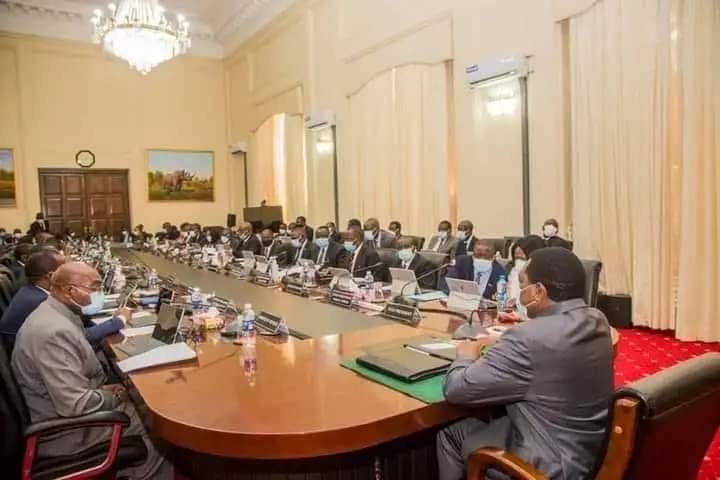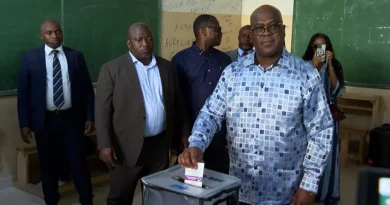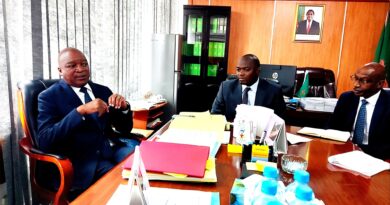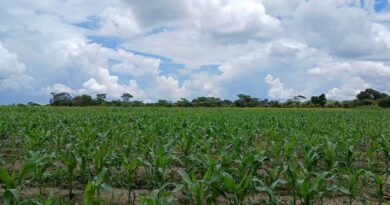3rd Cabinet Meeting
The President of the Republic of Zambia, Mr. Hakainde Hichilema, called for the 3rd Cabinet Meeting in the Year 2024, on Monday, 12th February, 2024, at State House to deliberate on legislative and policy matters aimed at developing the country for the good of the people.
Cabinet made the following decisions:
1, Legislative Matters:
(a) The Customs and Excise (Customs Clearing and Forwarding Agents) Regulations, 2024.
Cabinet approved the Customs and Excise (Customs Clearing and Forwarding Agents) Regulations, 2024, a Statutory Instrument intended to provide legal framework for the licensing and accreditation of Customs Clearing agents.
Prior to 2019, the mandate relating to licensing of the Customs and Clearing and Forwarding Agents was gazetted through customs rules by the Commissioner General of the Zambia Revenue Authority. However, the provision for licensing of Customs Clearing and Forwarding Agents was removed from the Customs and Excise (General) Regulations of 2000 to provide for standalone regulations.
The Customs Clearing Agents will, going forward, be required to be licensed by the Licensing Committee. As such, the 2024 regulations approved by Cabinet, will enable the operationalisation of the Licensing Committee and also specify the mandate, tenure and powers of the Licensing Committee. In addition, the regulations will enhance credibility, and align customs and clearing services with international best practices.
(b) The Animal Identification and Traceability Bill, 2024,
Cabinet also approved for publication and introduction in Parliament during the current sitting, “The Animal Identification and Traceability Bill, 2024.”
The objectives of this Bill, among others, are to repeal the Animal Identification Act No. 28 of 2010; to establish the Animal Identification and Traceability Unit and provide for its functions; provide for an animal identification and traceability system; provide for the registration of animal identification marks and agents and provide for the traceability of animals, animal products and animal by-products.
Cabinet is of the view that The Animal Identification Act No. 28 of 2010, is not comprehensive in providing for animal identification and traceability. It has, therefore, become necessary to repeal the Act, so as to establish a comprehensive animal identification and traceability system of animals, animal products and animal by-products.
(c) The Investment and Business Development (Amendment) Bill, 2024.
Another legislative matter approved by Cabinet for publication and introduction in Parliament during the current sitting is “The Investment, Trade and Business Development (Amendment), 2024. The objectives of this Bill are to delete the definition of “rural area;” extend the eligibility for incentives to investors who invest in an expansion project in a special economic zone, priority sector or rural area; and extend the eligibility for incentives to investors who invest in a new project or expansion project in a farm block.
It has been observed that currently, the definition of “rural area” is inadequate as it reduces the scope of beneficiaries for rural area incentives to facilitate economic development. Therefore, the Bill seeks to assign the ordinary meaning to the words. It is envisaged that the amendment will strengthen the legal framework on trade and investment promotion by widening the scope of “rural area” definition in order to increase the beneficiaries for rural area incentives and make the law easier to understand by those who will implement the law and the citizens.
2. International Instruments:
(a) Accession to the United Nations Water Convention.
Cabinet approved that Zambia accedes to the Water Convention (Convention on the Protection and Use of Transboundary Watercourses and International Lakes).
The main purpose of the Convention is to improve water governance at national, transboundary and international levels; to implement integrated water resources management at national, transboundary and international levels.
Currently, Zambia is not a State Party to the Convention on the Protection and Use of Transboundary Watercourses and International Lakes (Water Convention). As a result of not being a State Party to the UN Water Convention, the country has weak transboundary and international water governance as well as weak international integrated water resources management, that could result in tensions and differences at regional and international levels.
Therefore, acceding to the Water Convention will signal to the International Community which comprises International Financing Institutions, Bilateral Partners and intergovernmental organisations that Zambia is committed to international and transboundary water cooperation.
(b) Ratification of the Optional Protocol on the Involvement of Children in Armed Conflict
Cabinet also approved the ratification of the Optional Protocol on the Involvement of Children in Armed Conflicts as adopted by the UN General Assembly and which came into force on 12th July, 2002. Zambia is a State party to the UN Convention on the Rights of the Child, which in Article 39, requires all State parties to take appropriate action to protect children from vices of armed conflict and use in hostilities.
The UN General Assembly adopted the Convention in order to strengthen the provisions of the UN Convention on the Rights of the Child and provide for procedures and address substantive matters related to Article 39 of the Protocol. Zambia re-affirmed its commitment by signing the Protocol on 29th September, 2008 and is one of the remaining eight (😎 countries that have signed but not yet ratified the Protocol.
The Optional protocol is a commitment that, States will not recruit children under the age of 18 to send them to the battlefield, States will not conscript soldiers below the age of 18, States should take all possible measures to prevent such recruitment including legislation to prohibit and criminalise the recruitment of children under 18 and involve them in hostilities, States will demobilise anyone under 18 conscripted or used in hostilities and will provide physical, psychological recovery services and help their social reintegration.
(c) Ratification of the Optional Protocol on the Sale of Children,
Child Prostitution and Child Pornography,
Cabinet also approved the ratification of the Optional Protocol on the Sale of Children, Child Prostitution and Child Pornography in order to foster, promote justice and provide remedies concerning children so as to enhance the protection of the rights of children as provided in the UN Convention on the Rights of the Child and strengthen international cooperation.
Zambia has not yet ratified the Optional Protocol on the Sale of Children, Child Prostitution and Child Pornography. Ratifying the Protocol will, therefore, enhance the implementation of the rights of children in the UN Convention on the Rights of the Child, which Zambia is a party to. It will further enhance procedures on ending sexual exploitation and abuse of children; sale of children for non-sexual exploitation purposes such as illegal adoption, organ donations and forced labour; and Child trafficking and use of children in trafficking of psychotropic substances and abuse.
3, Diamond Independence Anniversary Celebrations, 2024,
In winding up deliberations for the day, Cabinet agreed that Zambia should celebrate her Diamond Jubilee Independence Anniversary on 24th October, 2024.
This year, Zambia will be marking 60 years of independence from colonial rule. For the past 60 years, Zambia has been a model of peace and stability in the region and beyond.
The country transitioned from multi-party democracy at independence to one-party participatory democracy in 1973 and returned to multi-party democracy in 1991. In the process, the country has seen peaceful transfer of power among four political parties namely, the United National Independence Party, Movement for Multiparty Democracy, Patriotic Front and United Party for National Development. The country has had seven Presidents since independence. While the country has 73 ethnic groupings, it has remained united. The commemoration is, therefore, aimed at nurturing the chords that have held the nation together over the last 60 years.
Hon. Brenda Tambatamba, MP
ACTING MINISTER OF INFORMATION AND MEDIA AND CHIEF GOVERNMENT SPOKESPERSON
16th February, 2024
Source: Ministry of Information and Media – Zambia



